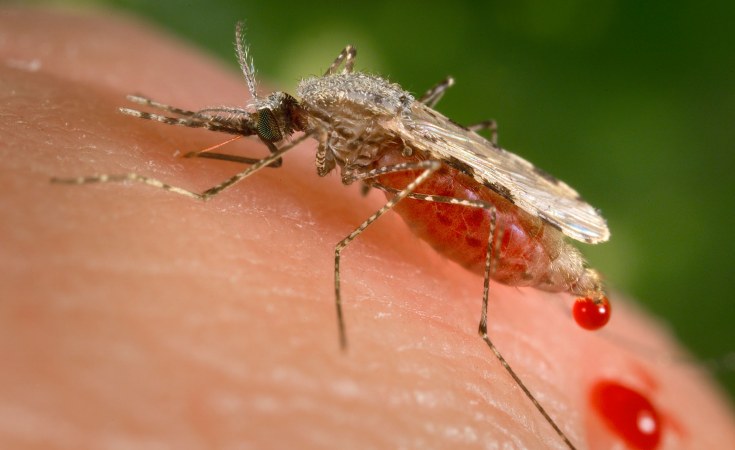Africa: Widespread Use of DDT for Malaria Control Worries Environmentalist
By Baboki Kayawe
The call for a total ban of DDT (dichloro-diphenyl-trichloroethane), a synthetic insecticide used in malaria-endemic countries that causes harm to the environment and human body, has sparked a debate.
Some people canvass its anti-malarial benefits while others cite its harmful effects on the environment and human health. It is banned in some countries even as many others use it to control mosquitoes that cause malaria.
Now, Prof Bontle Mbongwe, a Botswana academic and associate professor of Environmental Health and Toxicology at the University of Botswana, has joined the debate.
Any decision to ban DDT should be supported by evidence from an assessment of its risks to human health and the environment, Prof Mbongwe says, in an interview with Africa Renewal.
Cumulative evidence suggests that DDT and other pyrethroids (man-made pesticides) could have negative impacts on pregnancy, she warns, adding that, "Pyrethroids have also been linked to increased cases of mortality and an adverse effect on the cardiovascular system."
She suggests an in-depth study of the levels of DDT in breastmilk.
In addition, she laments that "The health impacts from exposure to persistent organic pollutants such as DDT are more acute in developing countries, especially on women and children's health.
"Because DDT does not degrade, it remains intact in the environment for many years; therefore, human beings and the environment are exposed to its toxic effects, some of which may affect the development of children.
"Even more concerning, DDT is transported through the environment and across boundaries through the soil, water, and especially air," she says.
Generally, the decision to use or ban DDT often depends on factors such as the cost-effectiveness of the alternatives, their hazardous properties and their impact on human health and the environment.
The environmentalist is among the newest members of the DDT Expert Group established under the Stockholm Convention on Persistent Organic Pollutants, an international environmental treaty signed in May 2004 that aims to eliminate and restrict the production and use of persistent organic pollutants.
DDT is one of the organic pollutants listed under the Convention.
The expert group handles the assessment of scientific, technical, environmental and economic information on the production and use of DDT and other alternatives for disease vector control.
"My role as a member of the expert group is to make sure that the government of Botswana, and other governments still using DDT, are advised appropriately based on science," she says.
Prof Mbongwe comes from a malaria-prevalent region; she seems to prefer a limited use of DDT, currently only permissible under the Stockholm Convention, in controlling the disease vectors, with recommendations and guidelines of the World Health Organisation, and when safe and affordable alternatives are not available locally.
This limited permission could be a first step toward containing the widespread use of DDT given the difficulty in eliminating its use immediately.
The good news is that the global use of DDT for disease vector control declined from 10 countries using it for Indoor Residual Spraying (IRS) in 2010 to five countries in 2019.
Prof Mbongwe undertook a comprehensive study of DDT in Botswana in 2000, measuring its concentrations and metabolites in water, plants, invertebrates and fish from selected lagoons in the large Okavango Delta where DDT has been used for approximately 50 years for malaria control and to treat African sleeping sickness.
Before then, in 2009, she collaborated with other researchers to analyze DDT and other pesticides in water where low levels of DDT metabolites were detected.
On the transition to alternative malaria control strategies, she says that training, financial support and research capacitation are needed, but noted that some organisations were already providing such assistance.
"For example, in terms of training, WHO continues to provide guidelines for malaria vector control which cover core and supplementary interventions, personal protection and other measures. WHO also provides support through the development of technical and operational guidelines," she says.
Still, countries often have limited capacity for entomological surveillance, insecticide-resistance monitoring and vector control, which are critical for programmes relying on IRS or Insecticide Treated Nets with few modes of action.
International organizations such as the UN Environment Programme, the UN Industrial Development Organization, the Global Environment Facility and the Bill and Melinda Gates Foundation are providing additional financial support for countries.
In terms of technology and research, efforts to develop new tools for malaria vector control are encouraged through collaboration between researchers and operational programme staff.
For alternative methods, Prof Mbongwe notes that insecticide-treated nets for control and elimination of malaria have increased in recent years, effectively reducing the reliance on DDT.
Countries in sub-Saharan Africa are shifting from DDT and pyrethroids to more organophosphate chemicals neonicotinoids.
Some countries' increased capacities for insecticide-resistance monitoring have led to improvements in the detection of DDT resistance, which, in turn, have encouraged other countries to consider non-DDT insecticides for IRS, Prof Mbongwe maintains.
"There is also a shift toward developing national strategies on IRM [Insecticide Resistance Management] for disease vectors. Finally, countries are taking measures to develop and implement Integrated Vector Management, and this can potentially reduce reliance on DDT and other chemical insecticides for disease vector control," she further explains.
Prof. Mbongwe will serve in the DDT Expert Group for five years. During her tenure, she hopes to advocate improving public education and research on chemical safety, which is limited in Botswana and other developing countries.
"I will work with other researchers and government officials to monitor pesticide residues in food with a focus on DDT," she assures.
She also plans to work with countries' ministries of environment, agriculture and health to sensitize the public on the use of DDT and other pesticides.
Such an intervention could be timely for countries, including Botswana, that are promoting agriculture and supplying farmers with pesticides.

No comments:
Post a Comment